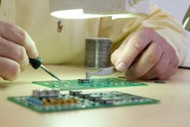Why the J-STD-001H Standard is So Essential for PCB-Assembling Companies
Jun 7th 2021
The J-STD-001H document is one of many control standards that help electronics manufacturing companies regulate the rapidly evolving electronics industry. Trends like high-density packaging, miniaturization of components, etc., are presenting the global electronics manufacturing industry with plenty of new opportunities. But, with these opportunities come complicated challenges. Quality control is a major challenge, and it can only be carried out with the help of well-defined control standards.
Thankfully, the global electronics manufacturing industry can always rely on the IPC (Association Connecting Electronics Industries) – the world’s leading organization, in creating quality standards for the manufacture, assembly, and design of printed circuit boards and other important electrical components. The American organization has historically been driven by the ever-intensifying demands of the U.S. defense and aerospace sector.
The strict nature of the IPC cannot be put into question. Electronics manufacturing or PCB assembling companies that don’t install IPC-recommended measures to detect defects in their products while they’re in their manufacturing stages suffer from consequences such as – unnecessary expenses on diagnosing the faults on the PCBs, costs of repair/rework, lost production time and lost reputation in the global industry.
That’s why all PCB assembly companies are extremely serious about ascertaining the quality of their assemblies with strict quality assurance measures. The J-STD-001Hdocument plays a huge part in this. This standard describes all the criteria PCB assembly companies need to follow (materials, techniques, etc.) to create high-quality IPC-certified soldered interconnections. The standard focuses on strict process control and presents specific requirements for various types of electronic products/components.
The Importance of Following the IPC-J-STD-001 Document
The IPC-J-STD-001 document, also known as “Requirements for Soldered Electrical and Electronic Assemblies,” is the fundamental guidebook that all manufacturers of electrical or electronic assemblies across the world need to follow. Be it manufacturing techniques or the materials used to create the electrical and electronic components - every stage of the PCB assembly and manufacturing process needs to be in accordance with the guidelines mentioned in the IPC-J-STD-001 document.
Mastering the J-STD-001 standard is a must for any professional involved in product supervision. Without the green signal given by a J-STD-001-certified professional, the acceptability of any soldered electronic assembly cannot be guaranteed.
Some other important IPC standards that deal with the topic of process-control include – the IPC-A-610 (“Acceptability of Electronic Assemblies”) and the IPC-7711/7721 (“Rework of Electronic Assemblies and Repair/Modification of Printed Boards and Electronic Assemblies”).
Mastery and certification in these standards is a must for professionals who are -
In charge of quality assurance
Involved in the manufacturing process, be it as an assembly operator or as a soldering professional
Training other workers in an organization on topics like quality control.
Even though offshore assembly processes save Western businesses a lot of money, being vulnerable to quality-related issues is never good for any business. Quality issues unnecessarily trigger PCB problems that quickly evolve into super-expensive repair requirements. That’s why PCB assembly companies that want to boost theircredibility and productivity must provide their employees with IPC training and certification in the J-STD-001 standard.

